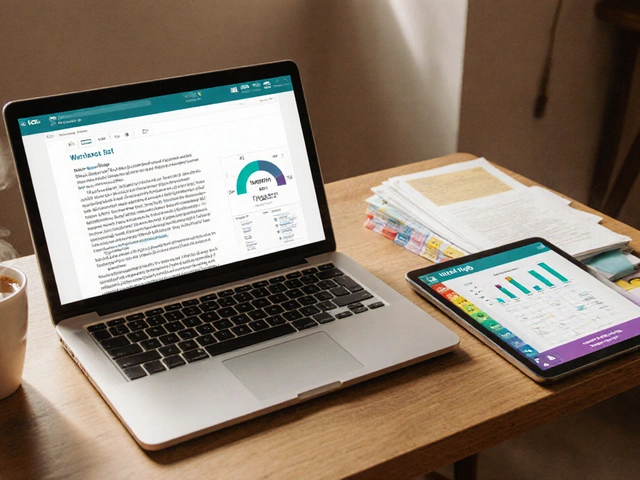Here's something people get wrong all the time: you don't actually need a “license” in most countries just to run a regular blog. If you’re writing about your favorite pancake recipes, posting travel stories, or sharing opinions, you’re free to hit publish on platforms like WordPress, Blogger, or Medium. Nobody's asking to see your blogging permit at the gate.
But there’s a catch—if you plan to turn that blog into a money-making machine, things change a bit. Monetizing a blog—think ads, sponsored posts, selling stuff—can blur the line between hobby and business. That’s when you might need to register as a business, get a tax ID, or sort out some paperwork, depending on your country. So before you jump in chasing those affiliate links, it’s smart to look up local rules.
- Is a License Really Needed to Blog?
- Legal Basics: What Bloggers Must Know
- Business Blogging: Extra Paperwork?
- Safer Blogging: Tips to Stay Out of Trouble
Is a License Really Needed to Blog?
Nope, you don't need a special license to run a blog—if you're just sharing your thoughts, tips, photos, or even daily stories. In 2025, most countries treat blogging as a form of free expression, not a business activity by default. That means you can set up a blog on WordPress, Medium, Blogger, or any other platform without filling out paperwork or paying state fees.
Here's the key: As long as you're not running it as a company, selling things, or making real money, there's usually zero red tape. The only real exception is if your blog covers super-sensitive topics, like politics or news, in countries with strict government controls (think China or Iran). In those cases, governments sometimes require bloggers to register, but for most people in places like the US, UK, Canada, Australia, or most of Europe, you’re in the clear.
Just to keep things straight, here’s when you might (rarely) need to think about registering or getting permission:
- Your country or local laws require news sites, public interest sites, or high-traffic blogs to register, even if they're not a business.
- You are blogging on behalf of a company or official group.
- Your blog talks about professional stuff, like financial advice or health tips—those areas sometimes have extra rules.
If you’re just writing for fun or sharing a hobby, go for it. The only real “requirement” is following the terms of service for your blogging platform, and that’s mostly about not posting anything illegal or harmful.
So, to sum it up, there’s no law in most places that says you need a blog license just to write and share online. And if you’re ever unsure, a quick check on your government’s website or a chat with someone in the know is all it takes.
Legal Basics: What Bloggers Must Know
When you start a blog, it’s tempting to just write and forget the boring law stuff. But skipping the basics can land you in hot water, even on your cozy corner of the internet. First up, copyright is real, and it will bite you if you just grab images or text from anywhere. Always use your own work, or get proper permission, or grab content from free-to-use sites like Unsplash or Pixabay.
Another key point—disclosure. If you’re getting freebies, money, or perks for talking about a brand, U.S. law (the FTC rules) says you must tell your readers. Stick a simple note at the top of your post. Other countries have similar rules, so don’t assume it’s a USA-only thing.
Privacy is getting serious, too. Many countries expect you to tell users if you’re collecting personal info—this includes stuff like email sign-ups or using cookies. Ever seen those cookie pop-ups? That’s why. For example, under the European GDPR law, you need clear privacy policies if you collect any user data, even basic stuff.
- Don’t copy or steal stuff—copyright is enforced online.
- Disclose paid promotions, sponsorships, even review freebies.
- If you collect emails or use analytics, post a privacy policy.
- Be careful with comments—moderate or filter them to avoid hate speech.
Here’s a quick look at some basic blogging legalities across popular regions:
| Region | Copyright Laws | Disclosure Rules | Privacy Policies |
|---|---|---|---|
| USA | Strict (Digital Millennium Copyright Act) | Required (FTC Guidelines) | Essential if collecting user data |
| EU | Strict (EU Copyright Directive) | Required | Mandatory (GDPR applies to most blogs) |
| India | Strict (Copyright Act 1957) | Encouraged, not always enforced | Recommended, especially for commercial blogs |
None of this should scare you away. Staying legal as a blogger is mostly about being honest and respectful. The rules sound scary, but if you stick to your own voice and play fair with content and user info, you’re already ahead of most new bloggers. Want to dig deeper? Most big blogging platforms like WordPress or Blogger have built-in privacy pages and copyright tips to help you keep it clean.

Business Blogging: Extra Paperwork?
So now you’re looking at cashing in and turning your blog into a side hustle or even a full-blown business. This is where things really pick up. When your blog starts bringing in money, tax authorities and even platform rules kick in. You want to be on the safe side, right?
If you’re making real income—a couple hundred bucks from ads, sponsored content, or selling e-books—most countries (like the US, UK, and India) expect you to report it. In the US, if you earn over $400 per year from self-employment, you must report it to the IRS. No joke, you could face fines if you skirt this part. Here’s a quick breakdown to keep things simple:
- Register as a business: Depending on your country, you might need to register as a sole proprietor, or set up an LLC for legal protection.
- Get a tax ID:
- If you’re in the US, that’s an EIN. In the UK, it’s a UTR.
- Collect and pay taxes:
- Set aside some of your blogging income because you’ll probably owe self-employment or income tax.
- Follow advertising laws:
- For sponsored content, disclosure isn’t optional. The FTC requires it in the US, and other countries have similar rules.
- Check local licenses:
- Some cities or states might want a home business permit, even if all you do is stare at a laptop in pajamas.
Hootsuite’s 2024 Digital Report says nearly 78% of all bloggers who earn over $1,000 a month file as small business owners or freelancers in their home country. That’s most of us once dollars start rolling in.
| Country | Minimum Annual Income for Reporting | Typical Registration Needed |
|---|---|---|
| United States | $400 | Sole proprietorship, EIN |
| United Kingdom | £1,000 | UTR, sole trader registration |
| India | ₹2,50,000 | GST (if selling goods), PAN |
Google’s official AdSense policy says,
“All publishers are responsible for ensuring that they comply with local laws regarding taxes and business requirements.”Ignoring this stuff might seem tempting, but it can bite you later, especially if your traffic, or earnings, take off.
Bottom line—if you want your blog license questions solved, focus less on government certificates and more on handling the business side right. Start simple: track income, save tax-relevant receipts, and register as needed. No need to panic, but don’t wing it either.
Safer Blogging: Tips to Stay Out of Trouble
Starting a blog is easy, but keeping it hassle-free takes some know-how. You don’t have to be a legal genius—just pay attention to a few basics and you’ll save yourself a lot of stress down the line.
One of the most common mistakes? Using random images you find on Google. That’s copyright trouble waiting to happen. Stick with photos you took yourself or use sites like Unsplash or Pexels. They’ve got loads of free images with licenses for bloggers.
Next, watch what you say. Spreading gossip or posting false claims can get you into hot water. Defamation lawsuits are real—even blogs with barely any traffic can get sued. If you’re sharing info that might be questionable, double-check your facts or stay neutral.
Blogging for cash? Then you’ve got extra rules. For example, in the U.S., the FTC wants bloggers to tell readers if they’re getting paid for reviews or using affiliate links. In the EU, GDPR means you have to tell people if you’re collecting their data (like using cookies or email signups). Transparency isn’t just about being honest—it keeps you out of legal messes.
- Blog license questions pop up most with monetized blogs. If you’re earning regular cash, look into business registration and tax filings for your country or state.
- Always credit your sources—text, images, even quotes. It shows respect and avoids copyright claims.
- Keep cybersecurity in mind. Hacks do happen, and nobody wants their blog taken over. Use strong passwords, set up two-factor authentication, and update your platform regularly.
Here's a quick look at what gets bloggers into trouble most often:
| Common Pitfall | How to Avoid It |
|---|---|
| Using copyrighted images | Stick to free stock photo sites or your own images |
| Fake reviews/scripts without disclosure | Add clear disclaimers for sponsored posts or affiliate links |
| Neglecting privacy policies | Publish a simple privacy policy if you collect visitor info |
| Weak website security | Update your site, use good passwords, enable two-factor auth |
| Ignoring business registration | Register if you make regular income and report your earnings |
Most blogging headaches can be dodged if you just double-check the basics and stay transparent. If you treat your blog like a small business—even if it’s just a fun side project—you’ll be a lot safer in the long run.






Written by Arjun Mitra
I am an IT consultant with a keen interest in writing about the evolution of websites and blogs in India. My focus is on how digital spaces are reshaping content creation and consumption. I aim to provide insights and strategies for those looking to thrive in the digital landscape.
All posts: Arjun Mitra